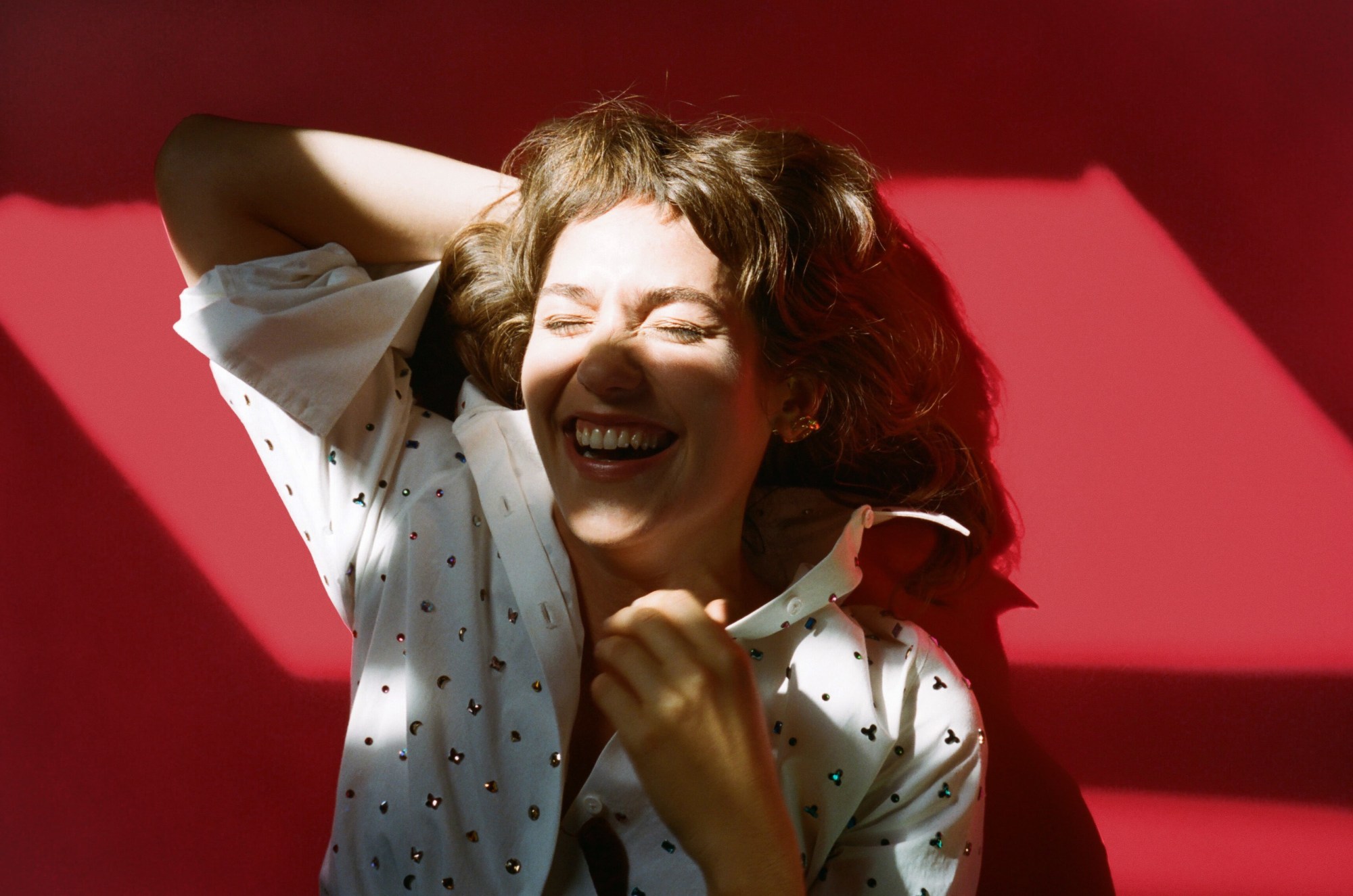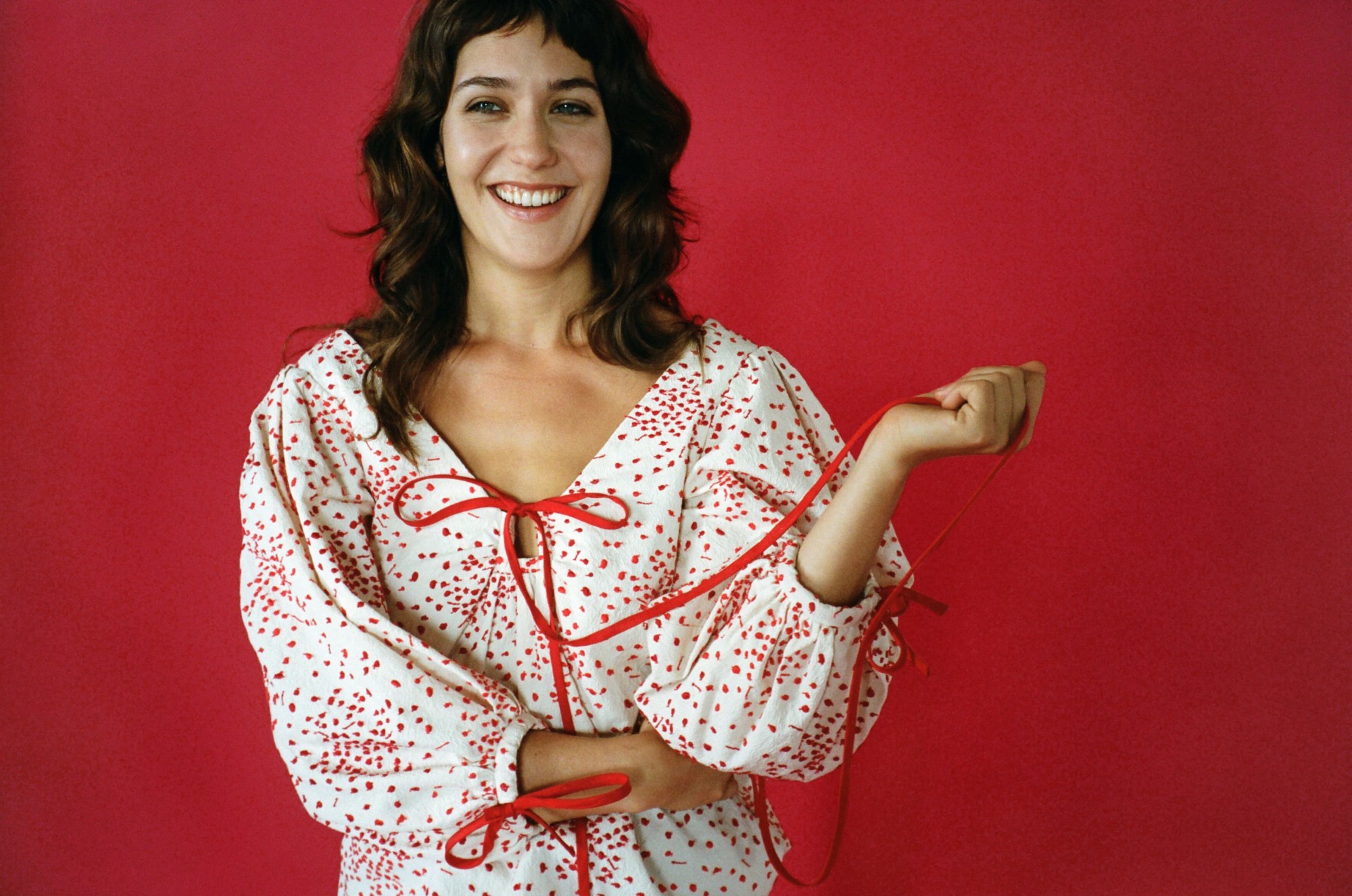It’s 10am on Friday morning, and Lola Kirke rings me from the road. She’s headed out from her eastside home to begin filming in Malibu (which, we both agree isn’t really Los Angeles although we both know that it technically is). It’s a change of pace — not just because of the beachy locale known for its palatial waterfront properties — but also for the fact that the star of Amazon’s Golden Globe winning Mozart in the Jungle and Noah Baumbach’s Mistress America has barely returned home from a mini cross-country tour promoting the release of her self-titled debut EP. The record is a handful of folksy tracks — a dreamy, experimental Americana — to accompany fantasies of settling on a utopian homestead in Joshua Tree. She recorded it at Moon Canyon Sound in Mt. Washington surrounded by beer, pizza, and her closest friends.
As she drives down the Pacific Coast Highway (a journey that can sometimes feel like it takes as long as traversing the country), we talk about the grounding power of anonymity, trusting your instincts, and playing for seven people smack in the middle of nowhere.
You just wrapped shooting your third season as overachieving oboist Hailey Rutledge on Mozart in the Jungle. How has playing that role inspired you to pursue your more musical side?
Not directly, but I’m sure subconsciously. I’ve been really lucky to play a character who is traveling this parallel path to my own. She’s doing this one thing that she’s done her entire life — that she identifies with and has been defined by — which is to play the oboe. And for me that’s being an actor. Then, in this season, my character starts conducting and, in doing so, assumes a role of leadership and control. For me, expanding my identity — being like “No, I’m also going to be a musician” — is a similar gesture. As a musician, I get to express the things that I want to express, not the things that someone else has put on a page. I love doing that as well, but this is more of a direct expression, and it’s something that I get to make mostly by myself or with people that I choose, as opposed to on a film set where I still just feel lucky to be there.
Also, the experience this last season of learning how to conduct showed me to trust myself, and that I know what’s best with my own music, because as a musician I still feel a bit like an amateur sometimes. Especially when I’m in a room with people who have identified as a musician their whole lives the way that I’ve identified as an actor. Hailey and her kind of “fake it ’til you make it” mentality, and the confidence that she has to employ as a conductor, is something that I have had to employ as a musician. The last thing I’ll say is that classical music has never been something that I’ve been particularly passionate or knowledgeable about. I’ve always had to substitute a genre of music that I do love — and I think stepping into the role of a musician more this year has made it so that in future seasons I’ll have better access into what that love that Hailey has looks like.
You describe stepping into the role of musician as a way of asserting control, rather than relinquishing it. How does pursuing music make you feel more in control?
Being an actor, you achieve a level of control, perhaps, at a certain point in your career. But for the most part you’re at the whim of the director, writer, editor, makeup, hair, basically everyone. It’s a collaborative effort, and more often than not that collaboration can bleed into something a little less democratic. As a musician, at the level that I’m at, I don’t have a big record label lording over me telling me what they want. I don’t even have a big fan base to please. So there’s something really freeing about the expression of music for me right now. I don’t know what that would look like if people starting writing negative reviews about me, and if I was aiming to please or trying to maintain an image. But right now it feels like I get to do what I want, and that feels great.
Related: How ‘Mistress America’ changed the game for female characters
Speaking of doing what you want, you just got back from an eight-show cross-country tour with your band and friends. How’d it go?
It was amazing. I toured with two people who made touring really easy. They are professional and very experienced musicians. My boyfriend, Wyndham Garnett, who also produced my record, and one of my best friends Lilah Larson, have both spent years on the road with their respective bands. Lilah’s in Sons of an Illustrious Father, with Ezra Miller, and Wyndham has played with Elvis Perkins, Clap Your Hands Say Yeah, and Cold War Kids. This was the first time that all three of us were on the road with just our solo projects, so we were all backing each other. I was doing harmonies and playing bass in Wyndham’s, and playing keys and harmonies in Lilah’s. And they were both playing various instruments in my set.
It was really humbling because, as an actor, I have gained a level of recognition in certain places in the world. That recognition does not exist is most of the United States — no one knew who the fuck I was. Not that anonymity is something I’m desperately seeking, because I do feel anonymous a lot of the time, but no one knew who I was, no one was walking toward me, no one was doing anything for me. We were lucky to have a few people show up to our shows. We were lucky to have a few people liking what we were saying or doing. The shows in our hometowns were big, but the ones in the middle of the country were not. One thing that struck me was that being an artist or performer is demeaning in a lot of ways. You need people to affirm what you do or watch what you do in order for it to be not just fantasy, for it to be real in a way. Especially because being an actor for the screen, you x out the audience. Your audience is something that’s far away from you, something that the camera is a medium towards. I did a lot of theater growing up, and I felt a certain level of skill at being present on stage, and I’ve lost that. Being on stage with seven people in the audience in the middle of Texas was a great avenue toward rediscovering what I want to do as a performer.

I imagine the craft services on an Amazon set differ greatly from the rider when you’re playing a seven person show in the middle of America.
What rider! [Laughs]. Totally. It was just real. It was fun. And it gave me a lot of opportunity to practice even more. I just learned how to play the bass for Wyndham’s set and I did not feel confident until I played the bass across the country in front of different people, and now I feel like I’m pretty good at this.
Is there something about how the road demands one to be nimble and spontaneous that you can take and apply back to acting?
There’s something about being comfortable with improvising. And also being real is really important. Whenever I’m acting, my goal is to get to a place where I don’t have to lie and I can be as real as possible. I think that being forced to put your ego aside and play a show even if only a few people show up is a great experience. I’m about to start shooting a movie right now, and I was nervous about changing gears from music into acting, but actually I feel so lucky that I get to express in a different direction now. Ultimately, I think it’s all about expressing and the art form is just the frame that you put it in.
Tell us about the making of your dreamy new video “Tomorrow Morning,” which we’re premiering here.
Well, we shot it as the season changed, and while I had spent many hours in similar streams in the height of summer, I had not done so in upstate New York on a cold fall day. So I did get really sick after that. The morning of the shoot, I went with my friend Zia Anger, an amazing filmmaker who I’m developing a feature with and who I’ve collaborated with on several short films, to the tractor supplies store and bought actual inner tubes. Then we went to the gas station and filled them up, headed down to the stream and shot for an hour. We asked Adinah Dancyger, who edited our footage so brilliantly, to find some stock imagery of animals and she found the perfect footage. I think the video is perfect for the song, and I just really love karaoke element of it.
No pressure, but can we expect a full-length anytime soon?
No pressure [laughs]. When I find the time to write. I’ve got a couple of songs already, but I need there to be more. Hopefully I’ll find some time soon and release whenever I can.
Given your hectic filming schedule, how do you carve out that dedicated space and time to write and play music?
It’s funny, I am really bad at just being, so I am constantly doing things. I’m sure that it’s some defect I need to work on, but it’s resulted in a lot of productivity. I wrote a ton of music during the last film that I was making. I think that there’s a way that writing and taking that space at the end of a work day, after shooting for 15 hours, really balances it out and let’s me take back my time. I think the two can go hand in hand, not that it will happen every time I’m shooting because sometimes I really don’t have the energy. But, sometimes, the energy I get from shooting is inspiring. When I’m like “today I’m going to write,” it doesn’t generally happen for me but songs, I think, pop up just when you need them to. But in my experience, writing music can be inconvenient, even. I’ll be trying to fall asleep and then a melody comes into my head and I have to get up and go record in the bathroom at two in the morning away from my sleeping boyfriend. I don’t know if I so much carve it out as much as it happens organically.
Credits
Text Jane Helpern
Photography Georgia Hilmer
Photography assistance Sergio Mejia
Styling Marcela Jacobina
Hair Blake Erik
Makeup Regina Harris
